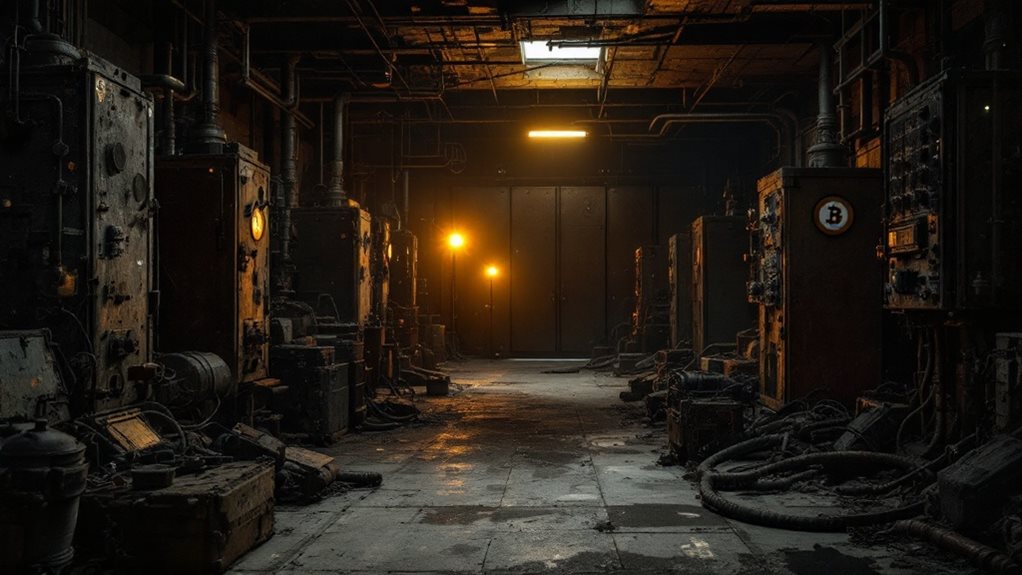When all 21 million bitcoins are mined around the year 2140, no new coins will be created. Bitcoin miners will then rely solely on transaction fees instead of block rewards to maintain the network. This change marks Bitcoin's shift from an inflationary to a deflationary economic model, similar to digital gold. The cryptocurrency's fixed supply makes it attractive to investors seeking inflation-resistant assets. The future of Bitcoin's network security and sustainability holds many fascinating developments.

As Bitcoin approaches its maximum supply of 21 million coins, questions are emerging about what will happen to the world's largest cryptocurrency network. The final Bitcoin isn't expected to be mined until around the year 2140, but the shift is already sparking discussions about how the network will operate in the future.
Currently, Bitcoin miners receive two types of rewards: newly created bitcoins and transaction fees. Once all bitcoins are mined, miners will have to rely solely on transaction fees to keep their operations running. This marks a significant change in how the network maintains its security and processes transactions. The process involves using computational power to validate transactions on the blockchain. The block reward halving occurs approximately every four years, gradually reducing the number of new bitcoins created. With approximately 19.5 million bitcoins already in circulation, the network is steadily approaching its maximum capacity.
The alteration will transform Bitcoin's economic model from inflationary to deflationary. With no new coins being created, Bitcoin's role as a digital store of value, similar to gold, could become more prominent. The fixed supply might make Bitcoin more attractive to investors looking for assets that won't lose value through inflation. Unlike traditional currencies that can be printed indefinitely, Bitcoin's controlled supply mechanism makes it inherently resistant to inflation.
There are some concerns about how this shift might affect network security. Some worry that without block rewards, fewer miners will participate in securing the network, potentially making it more vulnerable to attacks. The network's security will depend on transaction fees being high enough to incentivize miners to continue their operations.
Technology isn't standing still, though. Solutions like the Lightning Network are being developed to help process transactions more efficiently and reduce fees. Mining equipment is also becoming more energy-efficient, which could help offset some of the revenue losses miners face when block rewards end.
The Bitcoin network might need to adapt as it approaches the supply cap. This could include changes to how the network operates or new ways to guarantee miners stay motivated to secure the system. The cryptocurrency ecosystem continues to evolve, and new use cases are being discovered as the technology matures.
The impact of this shift will likely affect different sectors in various ways. Industries that rely on frequent, short-term transactions might face challenges if fees increase. However, long-term investment sectors, particularly in technology, could benefit from Bitcoin's deflationary nature.
While the end of Bitcoin mining is still over a century away, the cryptocurrency community is already preparing for this significant milestone. The network's ability to sustain itself through transaction fees alone will be vital for its long-term success, and ongoing technological developments will play a key role in shaping Bitcoin's future.
Frequently Asked Questions
How Long Will Bitcoin Mining Remain Profitable Before All Coins Are Mined?
Bitcoin mining's profitability timeline extends until 2140, when all 21 million bitcoins will be mined.
Mining rewards get cut in half every four years, but profits don't just depend on block rewards. They're also tied to Bitcoin's price, energy costs, and mining difficulty.
While block rewards will decrease, transaction fees are expected to make up more of miners' income.
The activity can stay profitable as long as revenue exceeds operational costs.
Can Bitcoin's Maximum Supply of 21 Million Ever Be Increased?
While it's technically possible to increase Bitcoin's 21 million supply cap through a "hard fork" in the code, it's extremely unlikely to happen.
It would need widespread agreement from Bitcoin's miners, nodes, and community. The change would go against Bitcoin's core principle of having a fixed supply.
Most people in the Bitcoin ecosystem strongly oppose changing the cap, as it could harm Bitcoin's value and credibility.
Will Transaction Fees Alone Sustain Miners After the Last Bitcoin?
Whether transaction fees alone will sustain miners after 2140 isn't certain yet.
It'll depend on Bitcoin's future popularity and usage. If Bitcoin becomes widely used, higher transaction volumes could generate enough fees to keep miners profitable.
But if usage stays low, some miners might quit, which could affect network security.
Mining costs, like electricity and equipment, will also play a big role in determining if fees are enough to keep miners going.
How Will Bitcoin's Price Be Affected When Mining Rewards End?
Bitcoin's price could see significant changes when mining rewards end in 2140.
Since no new bitcoins will be created, the fixed supply of 21 million coins paired with ongoing demand might push prices higher.
However, it's not certain, as prices will depend on multiple factors like market adoption, regulations, and the global economy.
The shift to transaction fees and Bitcoin's role as a mature digital asset could also influence its value.
Could Quantum Computing Break Bitcoin's Mining System Before All Coins Finish?
Quantum computers could potentially break Bitcoin's mining system before all coins are mined.
They're really good at solving complex math problems and might crack the cryptographic puzzles used in mining almost instantly. This would let quantum-equipped miners find blocks much faster than traditional miners.
It's estimated that within the next decade, quantum computers might be powerful enough to disrupt Bitcoin's current mining process and security system.





